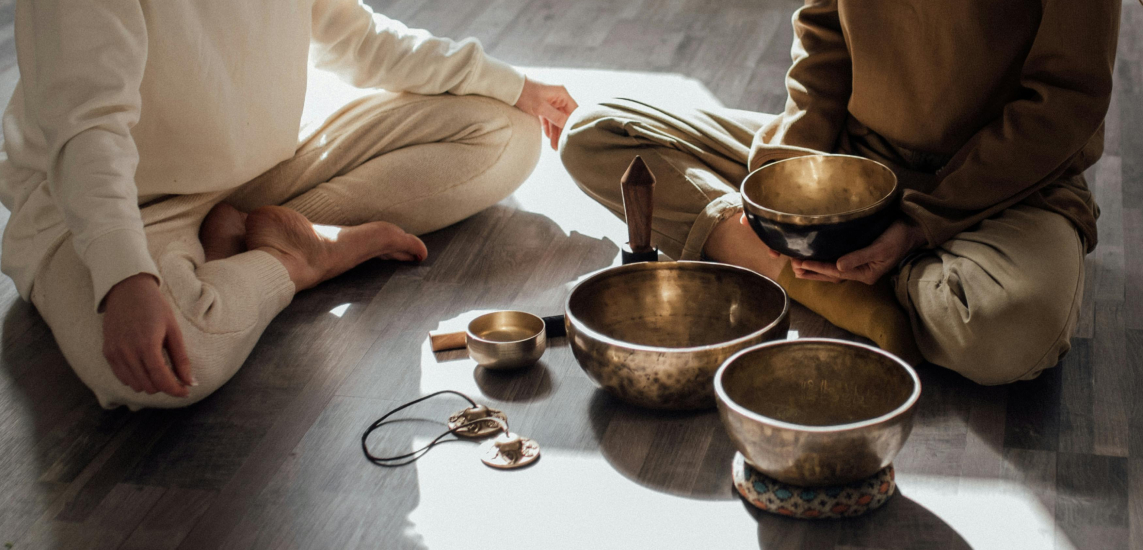Never mind the how’s, why’s and when’s of the process of meditation. What is the meaning of the word ‘meditation’ on all of its levels?
What Is The Actual Meaning Of Meditation?
There’s a strange symmetry when looking up “meditate” because the effort of seeking a definition is in tune with the expression itself.
With the Oxford English Dictionary we end up with the following:
Meditate (/ˈmedəˌtāt/): 1. Focus one’s mind for a period of time, in silence or with the aid of chanting, for religious or spiritual purposes or as a method of relaxation.
2. meditate on/upon Think deeply about (something)
3. (with object) Plan mentally; consider.
So, reaching for the precise definition of “meditate” or “meditation” requires a meditative process of focusing and considering. We literally begin by defining.
In Merriam-Webster we find:
Meditate (intransitive verb): 1: To engage in contemplation or reflection.
2: To engage in mental exercise (such as concentration on one’s breathing or repetition of a mantra) for the purpose of reaching a heightened level of spiritual awareness.
Then, once we include the word’s other two primary forms, we can add:
Meditation (/ˌmedəˈtāSH(ə)n/): 1. The action or practice of meditating. Contemplation. Reflection. Prayer.
2. A written or spoken discourse expressing considered thoughts on a subject.
Meditating (/ˈmedəˌtātˌ tēng/): 1. The gerund or present participle form of “meditate.” Contemplating. Thinking. Pondering.
When Was The Word First Used?
If we wish to dig further into the birth and history of the word, multiple etymological dictionaries suggest the word entered the evolving Western languages in the 1500s — from the Latin “meditatus” or “meditatio” — a past participle of “meditari” (meaning “to think over, reflect, consider or take appropriate measures;” ”to plan in the mind” or “to employ the mind in thought or contemplation, especially in a religious way.”) Our English understanding of “meditation” is derived from the archaic tongue of Old French and its word, “meditacioun.”
In keeping with the dominant spiritual movements of its time, the understanding and practices that would come to be associated with meditation emerged first in the traditions of the Roman Catholic Church, especially within its monasteries.
Author, historian and theologian Gervase Holdaway shrugs off tales of “meditate” arriving in the 16th century and tracked the first use of the term “meditatio” (and the first traceable concept of meditation in western parlance) as part of a spiritual process to French and Italian monks of the 12th century.
Europeans’ Understanding Of Newly Discovered But Ancient Practices
Once in European languages, the term was applied immediately as a translation for most Eastern spiritual practices and applications.
Whether we’re considering the Dhyāna of Hinduism and Buddhism or similar actives of Islamic Sufism, Jewish Kabbalah or Christian Hesychasm, that era’s “meditatio” allowed Europeans to ease into an understanding of new, emerging ideas within human understanding.
There is no brief history of meditation and its meaning in different ancient cultures. Discover the origin of meditation — or rather origins of meditation practices — and learn more about the diversity of meditation.
Of course, while Europe was adjusting its comprehension and vocabulary to embrace new frontiers, the East was well-versed in the practices that would come to fall under our definition of “meditation.” In India, the first written records of Dhyāna or Jhāna date from around 1500 BCE. The Hindu traditions of Vedantism explore meditation practices across India as far back as 300 BCE.
You might also be interested in learning about S. N. Goenka, the man who brought mindfulness to the Western world.
The Prefix “Medi-“: Care, Consideration & Peace
These historical accounts pour centuries’ worth of concepts and meanings into the words we define as meditative practices today. As we sift through all of that history, patterns emerge as signs eventually point repeatedly to the same Latin prefix, “medi-.”
In addition to “meditate,” we find those four letters in “medicine”, “medical” or “mediate”. The modern words that employ those four letters unite under the themes of care, consideration, and peace:
- When ill or suffering, we seek out medical care and take our medicine.
- When countries at war are finally willing to seek peace, ambassadors mediate until there’s a truce.
- When a human being seeks the peace of mind and spiritual revelation, there’s meditation.
A river of positivity and hope runs through the very spirit of each “medi-“ word.
While the conceptual meaning of meditation is deeply connected to care, consideration and peace, the benefits of meditation are numerous and worthwhile reading.
The Aura Of “Meditation”
Though the origin and complete etymology of “meditate” is clear enough to follow, obviously there’s more to this word than just a basic definition.
This term has a soul — an aura that speaks to the human psyche with an additional level of meaning.
Healing, Positivity, Energy
If engaged in the process of meditation, we are seeking, exploring, considering, pondering and opening ourselves to new possibilities. While a problem or a cause of suffering might lead us to meditate due to negative connotations at the outset, the moment meditation enters the equation, for many that word steers the scene into a more positive light.
In the process of meditating, meditators intend no harm to anyone and can do no damage to anything. Indeed, all of the energy, mental ability and spiritual force one can muster (whether as a beginner or a veteran practitioner) comes into play.
Meditating in any situation reveals a focus on the concern, care, and guardianship for one’s health and peace within the world. Our minds understand the linguistics of that, but our hearts feel its positivity.
More than a mashup of letters that came to us through the language of ancient Rome, the word “meditate” is a force that lightens the load the moment our eyes scan it or our ears absorb it.
In the end, the man or woman who encounters the term “meditate” in any variety senses that deeper significance and energy the word stores — coming away with more than a mere definition. They receive a gift of endless possibilities.
Discussing the meaning of meditation is a type of meditative practice itself. Dive into the endless possibilities of meditating and discover 20,000+ free guided meditations from all imaginable traditions, practice types, teachers, religions and concepts.






-1.jpg)

